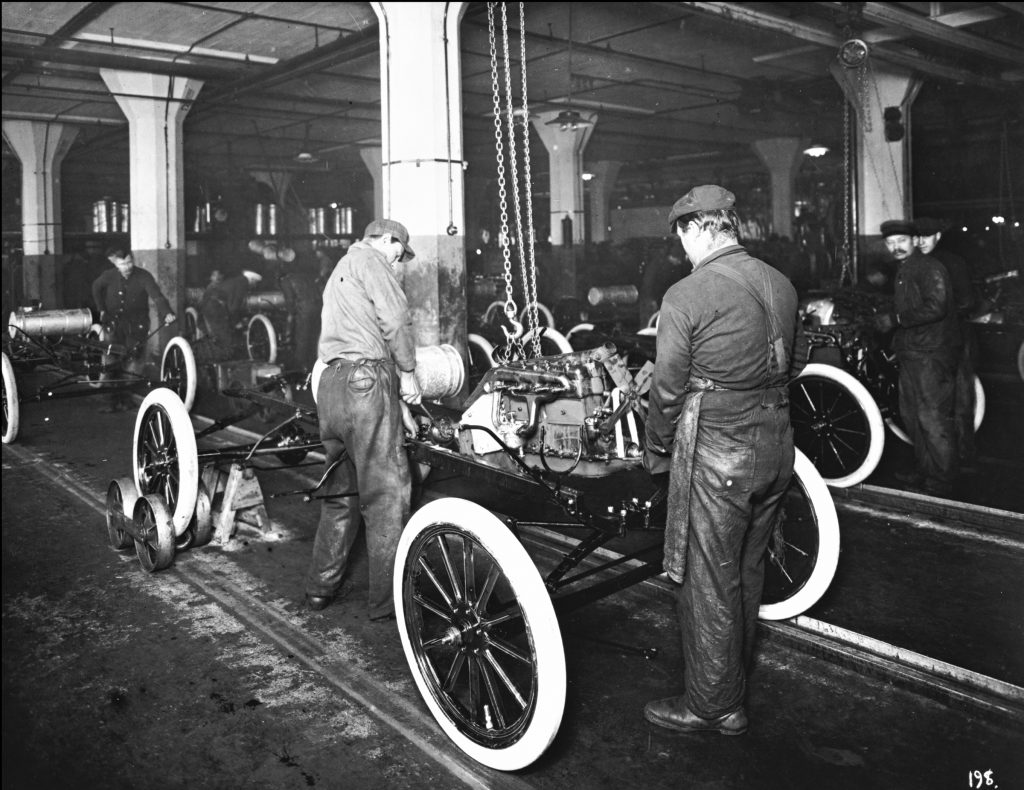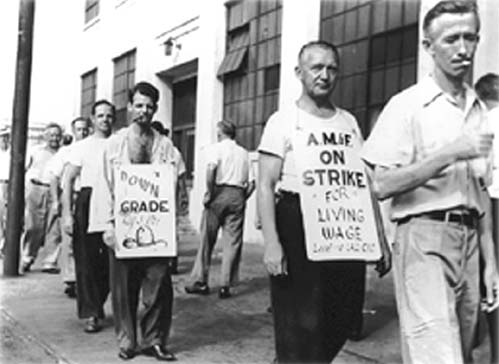There’s an interesting thing people usually don’t understand about capitalism: it lacks any inherent incentive to keep anyone poor. In fact, poor people in capitalism are useful as a reminder of what happens when you make the wrong choices, but they are useful only as an insignificant, token minority. In every other way, poor people are not only useless but in fact harmful, because poor people can’t buy goods and services that capitalism produces.
When thinking about capitalism, people who were brought up in communist countries always visualize dirt poor people working at Ford’s assembly line, but they somehow neglect to remember what they were building: a Ford model T, which is a working class car.
In capitalism, there are two primary motivations that determine the price of labor. First is the desire of the company owners to reduce the price of inputs in order to get the cheapest possible product, which they can then either sell cheaply and undercut the competition, or sell it at a greater profit margin compared to the competition. The second is the desire of the company to keep the workers motivated and employed long-term, in order to reduce the cost of labor turnaround. As a secondary consequence of the second motivation, the workers also get to keep enough wealth to purchase goods and services, and thus keep the engine of capitalism running.
It is perfectly understandable that no businessman will artificially raise wages above the current prices of labor on the market, just to keep the workers wealthy enough to have them purchase his products. As far as he knows, they’ll purchase something completely different and he won’t directly benefit from it in any way. However, if we assume that workers need to be trained, that experienced workers are more productive than the rookies, and that healthy and motivated workers keep being productive longer, there’s an inherent selfish motive in not paying your workers too little, because they will then seek out other jobs and work at your company only as a stop-gap measure until they find something that will provide them with a decent livelihood. Furthermore, you want to attract the best workers on the market, and hopefully the ones that work for the competition, in order to improve your competitiveness. So, essentially, there’s a feedback loop that increases wages when they drop far enough that people start working poorly and leaving you, and stops increasing them once it provides no competitive advantages to your company, and then starts reducing them until productivity starts dropping, and then starts raising them. It’s a selfish motivation on behalf of the company owner, but which essentially provides benefits to the workers. As a corollary, the workers get to keep enough money to have purchasing power, which creates the market for goods and services.
What capitalism doesn’t want to see are poor people, because poor people don’t buy cars or iPhones or houses or go on vacations, which is where capitalism makes money. Poor people are depressed, resentful, unproductive and troublesome in all imaginable ways. So, if you want to produce and sell your goods and services, you need to find that golden spot on the profitability curve, where you keep the inputs inexpensive enough to make a profit, and yet sell enough of your products to make the greatest possible amount of money. It would be naïve to think that any businessman would curb his selfishness and desire for profit for the greater good of society in general, but the aforementioned feedback loop, which directly influences the profitability of his enterprise, that’s what gets his attention. It is therefore not realistic to expect the capitalist to exploit the workers beyond a certain threshold, unless the situation on the marketplace is skewed for some reason, for instance there is a huge abundance of labor and shortage of jobs, and high labor turnaround doesn’t significantly harm profitability. However, in such cases the society in general is in such a poor state, this cannot go on for long before something gives.
Communism, however, has a different feedback loop. It thrives in poverty and languishes in prosperity. Communism inherently benefits from keeping the large masses of people poor, because that’s when it has the greatest popular support. The points where communism loses support is when people are well enough off to want to increase their level of income above that of their peers, but not poor enough to see communist egalitarianism as a life-saving measure. Basically, people who are dirt poor will want equality, and people who are well off will want to differentiate themselves from the masses. In my opinion, the main reason for the collapse of Yugoslavia’s kind of communism was the fact that the middle class was huge, and it felt restrained by the communist system enough to see the advantages of capitalism. Essentially, it became normal for people to have an apartment, a weekend house and a car, but then they wanted a house with a pool, a better car and imported fine chocolate. We here didn’t want capitalism because we were dirt poor and overworked in communism, but because we felt we could do so much better in another economic system. In the Soviet Union, the communist system fell for completely different reasons: it fell because the shortages of everything were so great, that at one point everything just stopped working altogether, and at the same time two other things happened: the outside threat of a war with America disappeared, and the government promised not to restrain protests. So, at the same time all the previously restrained forces, such as nationalism, re-asserted themselves, people stopped supporting communism because it failed to deliver on its promises, and the foreign threat no longer motivated them to endure hardships and tolerate faults of their own system. So, it looks similar, the Soviet and Yugoslav collapse, but the root causes were quite different. In Yugoslavia, the cause of collapse was the fact that the Serbs decided they have enough power to transform the federal state into a Serb-ruled one, and Croats and Slovenes decided they don’t want to play support roles in that movie. Combines with the utter absence of an external threat, and with the opinion within Croatia and Slovenia that they are pulling most of Yugoslavia’s economic weight and that they could do much better on their own, the positive cohesive forces vanished, and were replaced only with Serbia’s wish to keep everything together under its centralized rule. Having in mind that it is difficult for me to imagine Serbia not wanting to dominate other republics, it is also difficult for me to imagine how the country could have been saved. Czechoslovakia is often cited as an example of an amicable separation but neither Czechs nor the Slovaks had the intention of dominating the other republic. The Serbs, on the other hand, always saw Yugoslavia only as means that served their megalomaniacal ends. Yugoslavia never should have been attempted, and once created, it was doomed to end in bloodshed. I’ve seen Russian commentators lament American intervention and NATO bombardment of Serbia as if that caused the state to break apart, but in reality the American initial intervention was to send Eagleburger to Belgrade to tell the Serbs that they should quash the “rebellious forces” quickly and with any means, which hugely encouraged Milošević and weakened all forces in Serbia that would attempt a conciliatory political solution. Only after the country broke apart, Slovenia and Croatia went their own way, Croatia liberated itself from Serbian occupation and Bosnia was razed to rubble did the Americans finally do anything, which essentially only stopped Serbs from escalating the war onto Macedonia and, possibly, the neighboring countries. Essentially, they did everything to keep Yugoslavia in one piece, but after Croats failed to die quickly and in fact managed to assert themselves as the major military force in the region, they decided to cut their losses and stabilize the situation by prohibiting all further regional military engagements under a threat of force.
In the Soviet Union, nothing like that ever took place, and the dissolution of the union was much more amicable than one would be likely to expect, mostly because Gorbachev refused to use military force to quash the nationalist uprisings, which was a shame because they had very little public support and the breakdown of the union was against the will and interests of the populace, as shown in the 1991 referendum, in which over 70% of the votes were for the union’s continuation. For instance, 81.7% of Ukrainian voters voted for continuation of the union, and yet the minority of the political activists proceeded to declare Ukraine as an independent state, and this same minority led the Ukraine into a state of civil war and economic destruction. Essentially, the Soviet Union broke apart because the leadership didn’t act to quash the rebels who didn’t speak for the people, and Yugoslavia broke apart exactly because the leadership chose to quash the rebels who did speak for the people. Also, it helped that in Yugoslavia the “rebels” in fact spoke for their entire populations, while in the Soviet Republics the rebels spoke only for an insignificant minority, while the majority was too hungry, confused and afraid to do anything, probably mistaking the nationalist protests for the legitimate protests against the state of the economy. This is the thing: people who are not well off don’t know what they are protesting. They want things to be better, and their displeasure can then be co-opted by various nefarious forces. They protest poor working conditions and shortage, and then someone tells them they are protesting against communism, while the others tell them they are protesting in favor of national independence. Those who protest aren’t experts on either economy or geopolitics, they are experts of trying to make ends meet and failing. In the end, they might end up with more than they bargained for.
In the West, we have a somewhat similar situation, where nefarious people attempt to use generalized displeasure with the state of things in order to create support for their dubious agendas. Also, we have politicians who represent only themselves and are completely out of touch with the atmosphere on the streets. In addition, we have foreign powers pushing their agendas, for instance Saudi Arabia financing the spread of the most virulent and malevolent form of Islam across the world, using the petroleum money. The thing is, when people push for things to change because they are displeased with the current state of affairs, the kind of change they get might be completely different from the kind of change they hoped for. After all, people of Iran probably thought they were supporting the revolution against American influence and for more freedom, but they got a revolution for more radical Islam. To paraphrase a local saying, it’s late to regret it after you got fucked. So, I would advocate for great restraint in supporting revolutionary movements, and for more thinking about consequences, because the fall of Iran and Ukraine shows that optimism for change can often result in an endless nightmare.


